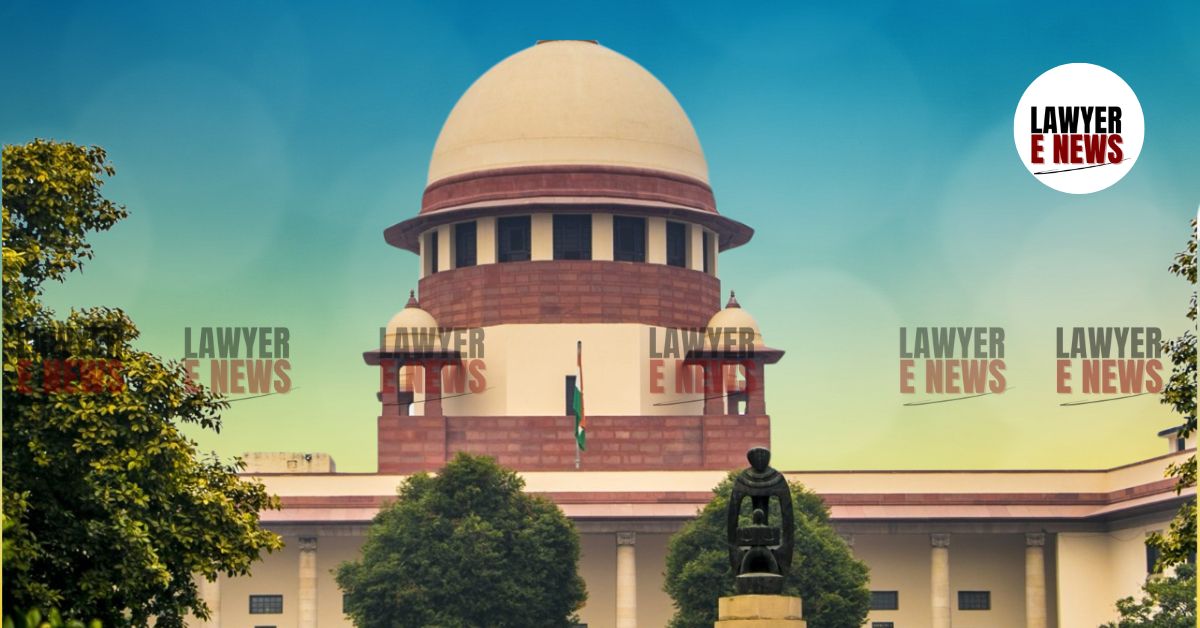-
by Admin
16 February 2026 1:47 PM



“We are unable to issue directions to consider the appellant as HPO… he accepted regularisation as CTO and cannot be permitted to turn around now” — In a significant ruling concerning service law, the Supreme Court of India, dismissed the appeal of Rampat Azad challenging his designation as a Carpet Training Officer (CTO), rejecting his claim to be redesignated as a Handicrafts Promotion Officer (HPO). The Court held that Azad, having accepted regularisation as CTO and having failed to challenge the relevant orders for over two decades, was "estopped from now asserting rights under the HPO cadre." The judgment draws a firm line on the principles of estoppel, acquiescence, and the finality of judicial orders in public service matters.
Rampat Azad was appointed on 15 July 1976 as a Junior Field Officer (JFO) in Group B in the Carpet Weaving Training Centre under the Ministry of Commerce. His appointment was temporary and ad hoc, under a planned scheme.
On 15 February 1978, by government order, all JFOs in the carpet scheme were redesignated as Carpet Training Officers (CTOs) and downgraded to Group C, causing loss of promotional prospects. Meanwhile, another order dated 4 June 1979 redesignated certain JFOs as Handicrafts Promotion Officers (HPOs) and retained them in Group B. Azad claimed that the failure to include him in the HPO category was arbitrary, discriminatory, and violative of Article 14 of the Constitution.
He approached the Central Administrative Tribunal (CAT) in 1997, which by order dated 2 December 1999, directed the regularisation of Azad as a CTO, not HPO. Azad did not challenge this order, and was later regularised in 2006 as a CTO, with UPSC concurrence. He continued to demand redesignation as HPO and related promotions, ultimately leading to this appeal before the Supreme Court.
The primary issue before the Court was whether the appellant, who had originally been appointed as JFO (Group B) but was redesignated as CTO (Group C), could now claim entitlement to the designation and benefits of HPO. The Court had to also consider whether Azad’s acceptance of the CTO regularisation, without any protest or legal challenge, precluded him from asserting fresh claims later.
Justice Abhay S. Oka, delivering the judgment, observed: “The appellant accepted regularisation as CTO and did not challenge the CAT’s 1999 order. Thus, he is estopped from seeking HPO designation now.”
The Court noted that while an order dated 16 May 1997 had restored the Group B pay scale of Rs. 550-900 to the appellant and similarly situated persons, it had not altered their designation as CTOs.
“The designation of the appellant and others as CTOs was never changed. What was restored was only the pay scale.”
The Court made a clear distinction between JFOs in the Carpet Scheme and those in the Marketing Scheme, holding that only the latter were redesignated as HPOs. Justice Oka wrote: “JFOs in the carpet scheme and the marketing scheme were two separate cadres. Only the latter were redesignated as HPOs. The appellant was appointed under the Carpet Scheme and his redesignation as CTO was valid.”
The Court dismissed the claim that this differentiation was arbitrary: “The work done by JFOs (Carpet Scheme) and JFOs (Marketing Scheme) was completely different. There is no merit in the argument that such distinction is artificial or discriminatory.”
Court on MACP and Scheme Closure
Rampat Azad had also argued that he was denied promotion opportunities available to HPOs. The Court rejected this claim, pointing out that the Carpet Scheme had been closed in April 2004, which rendered promotional avenues non-existent. Instead, Azad had been granted financial upgradation under the MACP (Modified Assured Career Progression) Scheme.
“The appellant was granted three financial upgradations making his pay equivalent to that of the Regional Director (Handicrafts) — the highest promotional post. No further relief is warranted.”
The Court underscored that this was done in compliance with the CAT's 2008 direction that the government should either create promotional avenues or extend financial upgradation.
“He Cannot Be Permitted to Turn Around Now”: No Relief After Accepting Regularisation
The Supreme Court highlighted the legal consequences of inaction and acceptance, noting that Azad had not challenged the 1999 CAT order, had accepted his 2006 regularisation as CTO, and continued service until retirement in 2013.
“The appellant never challenged the orders which treated him as CTO, and accepted regularisation and service benefits under that designation. He cannot now be permitted to turn around and claim that he should have been designated as HPO.”
Referring to the CAT and High Court’s earlier findings, the Court concluded that: “The Tribunal and High Court rightly declined relief. No error in their approach warrants interference.”
The Supreme Court dismissed the appeal of Rampat Azad, holding that his designation as CTO, once accepted without protest and judicially confirmed, could not be reopened decades later. The appellant’s service was regularised, he was granted MACP benefits equivalent to the highest promotional post, and there was “no surviving grievance” in law.
“Accordingly, the appeal is dismissed,” concluded the bench of Justice Abhay S. Oka and Justice Ujjal Bhuyan.
This ruling reaffirms a key principle of service law: when an employee accepts regularisation under a particular designation and does not challenge adverse administrative decisions in a timely manner, courts will not entertain redesignation or retrospective promotional claims years later.
Date of Decision: May 20, 2025
